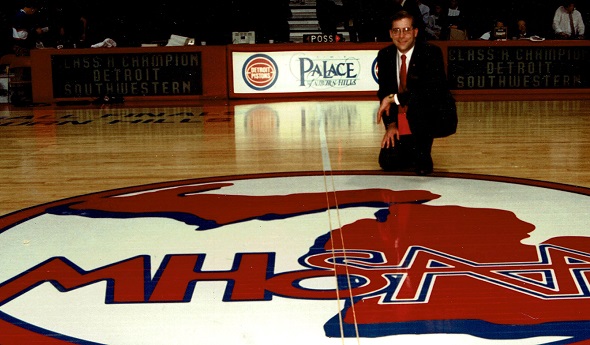
Johnson Served as Storyteller, Guardian
January 5, 2021
By Geoff Kimmerly
Second Half editor
Promoting the value – and values – of school-based sports.
No statement more completely, or succinctly, explains the mission of the Michigan High School Athletic Association.
Those words were sparked in the mind of John Johnson, and also might best describe his work for the MHSAA over more than three decades – which concluded with his retirement Dec. 18.
Johnson’s official title for most of his tenure was communications director, by which he designed and delivered the message of the MHSAA’s work. A more suitable title might have been “guardian” – Johnson in 1987 joined the then 62-year-old organization and became keeper and protector of all the MHSAA had been and was becoming under its recently-hired executive director, Jack Roberts.
More than 33 years later, “JJ” has stepped away as the pioneer in his field and having impacted multiple generations of Michigan high school and middle school athletes in ways that will continue. Whether as the coiner of memorable slogans, the voice explaining the nation’s first elaborate sportsmanship effort or detailing the MHSAA’s work for its schools during tougher times, or simply as the narrator passing on some of the good stories the bubble up from every season, Johnson daily worked to keep those who follow school sports in the know.
 “Being the voice, and having to be the face a lot, is something that came with the territory – somebody had to be the storyteller. And while you can be prideful about that, the important thing is still the story,” Johnson said. “I’ve said it a lot: I was the lucky guy who got the job. Because the story was there to be told, the work was there to be done.”
“Being the voice, and having to be the face a lot, is something that came with the territory – somebody had to be the storyteller. And while you can be prideful about that, the important thing is still the story,” Johnson said. “I’ve said it a lot: I was the lucky guy who got the job. Because the story was there to be told, the work was there to be done.”
Thousands upon thousands of times over the years, Johnson did that work with enthusiasm and grace. Most visibly, it came in front of a TV or radio microphone, or as quoted in your local newspaper and media nationwide. He has been the drive behind the MHSAA championship games watched annually on TV and online, and the messenger via various campaigns delivering the good news of why school sports are vital for kids and communities.
Serving as that storyteller, Johnson has never been one to tell much of his own. But there is no shortage of storytellers who have benefitted from Johnson’s wisdom and tutelage over the years – and we were enable to enlist a few to paint a more vivid picture as we recount at least a glance of what Johnson has meant to the MHSAA and its schools over these many years.
***
“The measure of all of us is what we leave behind. Those with whom we’ve been in contact. Those we’ve lifted up along the way. And by that measure, we are witnessing the end of a spectacular career. I’ll take away from all the exchanges, the ready smile, the encyclopedic knowledge that JJ possessed and the sense of calm within the frenzy. It was invaluable to those who popped into his world only a few times a year. John Johnson has left very large shoes in East Lansing.”
– John Keating, longtime FOX Sports Detroit anchor and host for many MHSAA Football and Basketball Finals
***
First and 1 of a Kind
Jack Roberts became the fourth full-time executive director of the MHSAA during the summer of 1986. He brought an emphasis on communication, and “communications director” became the first position he created in East Lansing.
Johnson in 1987 became that first communications specialist at the MHSAA, beginning a long last stop during a run in sports that Johnson began as a student at Mount Pleasant Sacred Heart, about an hour’s drive north of Lansing.
Johnson hadn’t played sports at Sacred Heart, but had taken part in just about every other way possible for a student. He was a team manager, statistician, student trainer, and picked up part-time sports writing work at the former Mt. Pleasant Daily Times. He wrote a series while still in high school on the creation of the MHSAA football playoffs, which were set to kick off in 1975, and that series was syndicated among the newspapers in the Daily Times’ chain. As a student, Johnson moved on to Michigan State University where he majored in journalism, and again he was published and syndicated by the Daily Times – this time for a series on how game officials were being trained by state associations, including the MHSAA.
That series foreshadowed the work he would take up a decade later – it closed with a piece on poor spectatorship toward officials. (Coincidentally, the collection of stories had been clipped and saved by the MHSAA executive director at the time, Vern Norris. The file found its way to Roberts, who eventually found out he had just hired the author.)
Also having served as a student assistant in the MSU sports information office, Johnson began his communications career at Albion College in 1978 as an assistant in the college relations office with responsibility for publicity for the college’s 17 athletic teams. (He didn’t graduate from MSU until 1979, but received two days off per week to get back to East Lansing for classes. He also served as a radio voice for Albion High games on the side.) Johnson moved on to brief stints in the news department with WITL Radio in Lansing and as an intern in the Office of Public Affairs at Ferris State University before landing with the Western Michigan University sports information department as an assistant director.
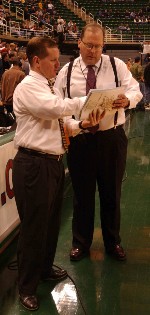
That led to a three-year stint as an assistant sports information director at Indiana University, where his responsibilities included serving as SID for coach Bobby Knight’s men’s basketball program. Johnson also assisted with press operations at the 1984 U.S. Olympic Basketball Trials hosted by IU. Johnson then left Indiana in January 1986 for a promotions position at Michigan Farm Bureau.
Six months later, his eventual journey to the MHSAA accelerated.
Roberts was hired during the summer of 1986, and not long after he asked MSU sports information director Nick Vista who had been his best student assistant of the past decade. The answer: John Johnson.
Johnson and Roberts met multiple times over the next many months, and Roberts made his choice.
“From the first moment I sat down with Jack Roberts, I knew I wanted to be here,” Johnson said. “The way he talked so passionately about high school sports, and the values of high school sports. … I saw the opportunity to take Jack’s vision and run with it.”
The day before the announcement of Johnson’s hire was to be made, Roberts asked Johnson to come with him to Grand Rapids to watch South Christian basketball star Matt Steigenga (later of MSU and the NBA) – but Johnson couldn’t go because his wife Suzie had gone into labor with their first of two children.
But a little more than a month later, Johnson started at the MHSAA on April 1 – and that came with plenty of jokes on its own.
Yet while Johnson had to miss that trip to Grand Rapids, he and the executive director would get plenty of car time together – to the benefit of the MHSAA’s member schools. To introduce themselves to statewide media, Roberts and Johnson did a driving tour to visit all of them, touring their offices, talking to them about MHSAA initiatives and asking how Association staff could better assist the media in its work. Those drives also allowed them to dream up together “the kinds of things that were unveiled over time,” Roberts recalled.
“We talked so much those first 15 years, we could intuit each other’s thinking the last 15 years,” added Roberts, who retired from the MHSAA in 2018. “We didn’t spend nearly as much time together, but we didn’t need to.”
***
“John Johnson has positively influenced so many more people than he knows and more than anyone realizes. It starts with the thousands and thousands of people who have been able to watch high school sports on the web throughout Michigan. Live-streaming of games has really come to the forefront due to the pandemic, but he was on top of this innovation nearly a decade ago when it was just in the early idea stage. He has been the person who orchestrated and led the countless schools across the state who started streaming their games in the past several years.
“JJ has also impacted numerous student journalists who wanted to learn the craft by covering high school games. He has always been SO supportive of these aspiring broadcasters and writers and reporters, affording them the opportunities to cover high school championships on the biggest stages, and treating those students the same as their professional peers. The students got to be on the turf at Ford Field and in the postgame press rooms, even if their school's team wasn't involved in the game! All they had to do was ask for credentials, and he granted them time and time again.
“JJ's influence also touched those of us who work for the MHSAA in a freelance fashion at various championship events. He has helped so many of us become better communicators, announcers, statisticians, and more. He was always willing to provide feedback & opportunities to learn, and he served as our leader who was always accessible morning, noon, and night. He pushed us to be our best every game, just as the athletes were trying to be their best. It's been my pleasure to work for him as a PA announcer for several years now, and I tried to be perfect every single time because I knew he was listening and because I wanted to do well for him.”
– Roger Smith, advisor for Lake Orion High School’s nationally award-winning School Broadcast Program and public address announcer for MHSAA Finals
***
Telling the Story
In Roberts’ eyes, a few campaigns from his and Johnson’s time together stand out most.
• Promoting the Value – and Values of High School Sports. “I came in with “School Sports – the other half of education” but that wasn’t as good,” Roberts said. … (His words) caught our brand much better.”
• Good Sports are Winners. The MHSAA launched a sportsmanship initiative a few years into their tenures that was “unparalleled” nationally, per Roberts’ description. “Before sportsmanship was an 'in thing' to talk about, John and I were talking about it.” Johnson created all of the print and broadcast materials designed to promote improving sportsmanship, and his work helped make Michigan not just the leader but a voice nationally on the topic.
• Safer Than Ever. The campaign, stretching over much of the last decade, explained that high school football – for a variety of reasons – is safer than it has ever been. Johnson worked with the Michigan High School Football Coaches Association to build the messages and promote them at a time when injury fears were regularly headlining media coverage.
 “John made our ideas visible and practical. People would put them together at the league level and school district level,” Roberts said.
“John made our ideas visible and practical. People would put them together at the league level and school district level,” Roberts said.
“To narrow (his work) down to three is unfair to him because he did a thousand things.”
And in a number of roles. Johnson started as communications director, picking up along the way responsibilities in information technology, marketing, merchandising and more. Everything from daily media questions to maintaining the MHSAA record book (and serving on the National Federation of State High School Associations (NFHS) national record book committee) fell onto Johnson’s desk, and just about any message read at any game by a public address announcer was his work. His final years were as “all things broadcasting” as Johnson served as the MHSAA’s first director of broadcast properties – an all-encompassing title that included all-encompassing responsibilities.
The MHSAA provides video broadcasts of nearly all of its MHSAA Finals – including football and basketball with FOX Sports Detroit – and Johnson has navigated the growth of those opportunities. Same with the MHSAA Network’s audio offerings during championship events, and his voice has been heard weekly during “This Week in High School Sports” which is aired as part of programming by more than 100 radio stations statewide.
The most significant advance under his guidance over the last two decades has been the School Broadcast Program, begun for MHSAA schools during the 2008-09 school year. The MHSAA relied on that knowledge in playing a leading role last decade in the formation of the NFHS Network – the nationwide digital home for live and on-demand high school events – and it’s not unusual for Michigan SBP schools to broadcast upwards of 500 events per week via the network.
“What people don’t necessarily know is John is the pioneer in this field,” MHSAA Executive Director Mark Uyl said. “The way he shaped this job over the last 30 years has been extraordinary – and has become the model for the 49 other states.”
***
“I’m sure that with me, JJ had to do things he never had done with anyone else – I was pregnant three straight schools years. The accommodations for me, even as just a female, it was kinda crazy especially in the 1980s. But when I was pregnant, I couldn’t walk up stairs, and he always would make special concessions for me, (like to) try to find bathrooms for me. There were so many media, and there always had to be exceptions, but he always had to take special care for me, and I’m so thankful for what he did. We laugh about that stuff all the time.
“I remember too, I had a tragedy in my family one year, and I know he was busy at the Finals, but he took me (aside), sat there and cried with me and talked with me. He took time out of his way. He treated me professionally, like everyone else. But as a person, he has such a gift to connect with people.”
– Jane Bos, longtime prep sports editor for the Grand Rapids Press and 2008 recipient of MHSAA Women In Sports Leadership Award
***
More than Scratching the Surface
The work Johnson pioneered at the MHSAA goes on. Formerly a staff of one (with help from valuable volunteers including long-time postseason assistant Walter Dell) now includes a team of employees to handle the media relations, publications, broadcasting, marketing and other messaging needs.
While making the rules for school sports remains the top priority for the MHSAA, telling the story of their importance in students’ lives comes in a close second – and Johnson has written at least the first chapters of the book.
“It needed to be done; the Association had to take bigger steps into the communications world. And thanks to Jack Roberts, it did. I was the lucky guy who landed in the chair,” Johnson said.
But again, that is simply scratching the surface. We’ll end with longtime Detroit Free Press sportswriter Mick McCabe taking a last deep dive.
I first met John Johnson in the late fall of 1977.
He was a student at Michigan State and worked in the sports information office. I was a sports writer for the Detroit Free Press, covering MSU basketball, featuring JJ’s brother, Earvin.
Well, maybe Earvin and JJ weren’t exactly blood relatives, but they were both fun to be around and each had a profound effect on my life.
No, really.
When watching the Spartans back then you knew you were watching someone special, which is why they called him Magic.
 No one ever used the word magic in describing JJ, but he was young and enthusiastic and sociable while he learned the tricks of the trade under the watchful eyes of Fred Stabley Sr. and Nick Vista, the absolute best sports information directors in the country.
No one ever used the word magic in describing JJ, but he was young and enthusiastic and sociable while he learned the tricks of the trade under the watchful eyes of Fred Stabley Sr. and Nick Vista, the absolute best sports information directors in the country.
That is why I knew JJ would be such a good fit at Albion College, which just so happened to be looking for an SID when JJ was graduating from MSU.
JJ was exactly what Albion needed and did an excellent job and soon JJ’s career was off and running.
Somewhere along the way JJ landed at Indiana University where Bob Knight learned to tolerate JJ. If you’ve ever met Knight and understand his relationship with other human beings, you know that is like saying JJ and Knight were besties.
That was reinforced in the spring of 1984 when I spent almost two weeks in Bloomington covering the U.S. men’s Olympic basketball trials and interacted with JJ on a daily basis.
In the spring of 1987 JJ accepted a job with the Michigan High School Athletic Association. It was a job that hadn’t existed before JJ came riding into town.
Jack Roberts was in his first year as the MHSAA’s executive director and JJ was one of his first hires. He was also one of his best.
JJ was hired as the MHSAA’s first communications director. Before JJ arrived the words “communication” and “MHSAA” had never been used together in the same sentence.
If a member of the media had a question for the MHSAA chances are good it would never be answered.
That changed the minute JJ was hired. If he didn’t know the answer, he got the answer for you. And if you needed to speak with someone about a particular question, JJ got you to that person.
It wasn’t JJ’s job to do our job for us, but the thing we didn’t want was for him or someone else from the MHSAA to get in the way of us doing our job.
Not only didn’t JJ get out of the way for us, he helped us and made our jobs easier with the way he ran communications for the MHSAA.
A few weeks ago, with JJ’s imminent retirement growing closer, someone asked me to describe the worst phone call I received from JJ, one in which he was irate with something negative I had written about the MHSAA.
Certainly, he assumed, over 34 years there had to be many such phone calls.
He was genuinely surprised to learn it never happened. Not even once.
JJ knew that the media has a job to do and his job didn’t require him to complain when something negative about the MHSAA was written. I’m certain it was a lesson he learned from Stabley and Vista, who operated the same way.
As far as I know, the only times JJ ever called a member of the media after a negative story was when the reporter had the facts wrong. His call just pointed out the errors and he left out the tongue lashing.
JJ was the consummate professional in doing his job and he did it better than anyone else.
There is no way I am going to describe JJ’s job performance at the MHSAA as magical, like Earvin’s, but it was pretty darn close.
PHOTOS: (Top) MHSAA Communications Director John Johnson kneels at midcourt at The Palace of Auburn Hills in 1990 having designed the floor for that year's Basketball Finals. (2) Johnson, middle, wears the headset during a playoff production. (3) Johnson, right, coordinated media, announcing and stat-keeping among other areas during MHSAA events at the Breslin Center. (4) Johnson, far left, stands with (from left) MHSAA public address announcers Roger Smith, Erik O. Furseth, Tony Coggins and Steve Miller during a Baseball/Softball Finals weekend. (5) Johnson walks the turf at Ford Field during a Football Finals. (Photos from MHSAA archives.)
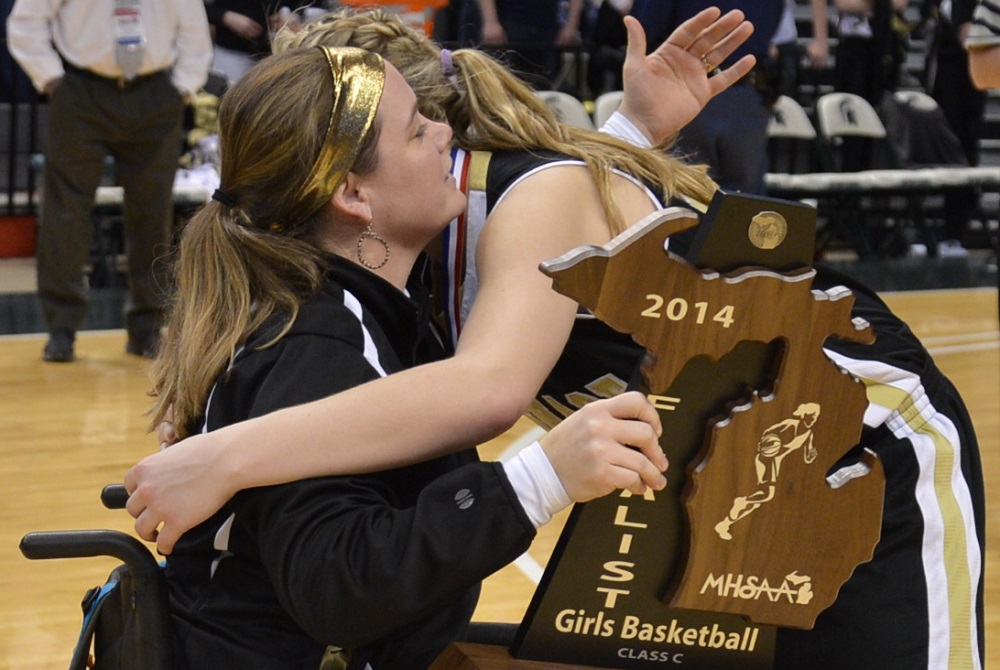
Championship Team Builder Ingalls Named WISL Honoree
By
Geoff Kimmerly
MHSAA.com senior editor
March 22, 2021
Krista Clement played for high-caliber basketball programs at St. Ignace High School and University of Michigan. Then, after a few years of teaching, she decided to start her own team.
In 2013, Clement founded Helper Helper – a digital platform that provides tracking and coordination for community service efforts across the country and counts the NCAA among partners.
At first, Clement’s team was a team of one – herself. But as she started to build the company, her thoughts turned to her high school coach Dorene Ingalls – one of the most successful team builders in MHSAA history.
“Although we aren’t playing basketball on the Helper team, so much of what I do was through what I’ve learned from Dorene’s leadership,” Clement said. “My attempt to create a culture on my team – similar to a Saints basketball team – has come from Dorene. I now find myself trying to connect with my team the way Dorene connected with me – making my teammates feel valued and inspired to put their best foot forward every day.”
Over the last 22 years, Ingalls has built one of the most respected high school basketball programs in Michigan and become one of the most successful coaches in MHSAA history. She also has been one of the state’s most impactful advocates for girls basketball, and a presence in her adopted hometown that literally earned her the title of “ambassador” from the local chamber of commerce.
To celebrate her many and continuing contributions, Ingalls has been named the 34th recipient of the MHSAA Women In Sports Leadership Award, presented annually by the MHSAA’s Representative Council to “women coaches, officials and athletic administrators affiliated with the MHSAA who show exemplary leadership capabilities and positive contributions to athletics.”
And as with Clement, those contributions continue impacting many long after graduation.
“To have the confidence to overcome when people say you can’t do something,” Ingalls said, boiling down what she’s hoped to pass on over two decades. “We still always are like the ‘Hoosiers’ coming down (to a state championship game) – we go with that flow a little bit. We’re not going under the radar too often, but usually we don’t have as many DI (college) people as the teams we play. We try to make sure (our athletes learn) that hard work, dedication, positive attitude and don’t ever give up, fight through your adversities and just keep going, keep going, keep going.
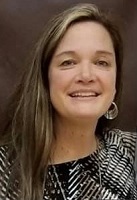 “I get letters from kids that went to boot camp that said, ‘Oh my gosh, the only way I survived this is because of our practices and our tryouts. All these other kids are stopping, and I keep going.’ … Other ones go on to be doctors and nurses in the field. That’s what it’s all about, when kids are fighting through stuff. If they have all-nighters, they can figure that out and they know they have that inner strength they haven’t tapped into yet, that willingness to keep going. I think that’s what high school sports are about – teaching them the skills they need in life, to fight through things, that you’re capable of more, you just have to sometimes dig deep, shake it off and step it on up. … It’s just kind of a thing that sticks with some of these kids, and when you see them or get invited to weddings or whatever, it has nothing to do with records or scoreboards. It’s continuing in their life, watching them have families and successes in careers – that’s when it’s fun.”
“I get letters from kids that went to boot camp that said, ‘Oh my gosh, the only way I survived this is because of our practices and our tryouts. All these other kids are stopping, and I keep going.’ … Other ones go on to be doctors and nurses in the field. That’s what it’s all about, when kids are fighting through stuff. If they have all-nighters, they can figure that out and they know they have that inner strength they haven’t tapped into yet, that willingness to keep going. I think that’s what high school sports are about – teaching them the skills they need in life, to fight through things, that you’re capable of more, you just have to sometimes dig deep, shake it off and step it on up. … It’s just kind of a thing that sticks with some of these kids, and when you see them or get invited to weddings or whatever, it has nothing to do with records or scoreboards. It’s continuing in their life, watching them have families and successes in careers – that’s when it’s fun.”
Ingalls has provided two decades of experiences on and off the court her Saints will never forget.
Through the end of this regular season, she has led the St. Ignace girls basketball varsity to a 464-80 record since taking over the program prior to the 1999 season. Her wins are the 18th-most among girls basketball coaches in MHSAA history, and she has led teams to five Finals championships and four runner-up finishes – or a championship game berth to conclude nearly half of those seasons as head coach. Her teams have reached at least the MHSAA Semifinals 11 times, and won 16 conference, 18 District and 14 Regional championships.
Ingalls also has served 20 years as a board member for the Basketball Coaches Association of Michigan (BCAM), including a three-year term as part of the executive board serving as president-elect, president and past president, and she continues to serve as chairperson of the Miss Basketball Award committee. She also has served on the MHSAA Basketball Committee.
“Dorene is someone who has been passionate for years about providing opportunities for young women,” MHSAA Executive Director Mark Uyl said. “That's easily seen in the work she's put in not just with her program but as a strong voice of leadership for the Basketball Coaches Association of Michigan. She's been one of the strongest advocates for girls basketball in our state over the last 20 years.”
There’s some necessary context behind all of those on-court win-loss numbers. St. Ignace has only about 200 students and generally plays in Division 3 (or formerly Class C) or Division 4 – yet during the regular season the Saints frequently line up games against much larger opponents from all over the state. They’ve had their share of stars, especially for such a small schools, but the success is also a testament to how Ingalls works to find specific roles for as many players as possible – whether it’s for a minute here or there to grab a rebound or get a steal, many play at least some little part in keeping the team moving forward.
And the memories made off the court have meant just as much, if not more.
Clement, who became the Upper Peninsula’s first Miss Basketball Award winner in 2003 and then a four-year captain at U-M, recalled how much she and her teammates laughed with their coach and how Ingalls has a talent for connecting with her players.
“Her record by itself could garner consideration for this award, but that is not the primary reason I write this letter,” wrote St. Ignace superintendent Don Gustafson in nominating Ingalls for the WISL Award. His daughter Linnie played for Ingalls four seasons before graduating in 2018.
“She teaches basketball, but she teaches much more than basketball. The characteristics that Dorene models for the athletes who have played under her tutelage are dedication, perseverance, teamwork and life lessons, to name a few. The players she has coached in the past stay connected with Dorene long after that graduate, as (she) continues to provide guidance and advice even after the student athlete’s playing days have concluded.”
Like many families, cancer has impacted the Ingalls – both she and her husband Doug lost their mothers to the disease when those women were only in their 50s. St. Ignace’s trips to East Lansing, or Grand Rapids to play at Calvin College, or last year to Detroit to play in the Motor City Roundball Classic, included trips to medical facilities.
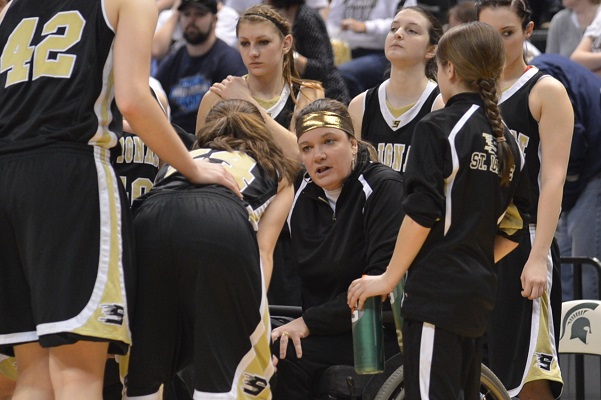 At the cancer center in East Lansing, the Saints inadvertently crossed paths with a St. Ignace resident undergoing treatment, and Dorene still is brought to tears retelling how they connected with that patient and were able to give her tickets to come watch them play that weekend. The Grand Rapids center was where Ingalls went through rehabilitation after suffering paralysis during childbirth in 2005; she remains partially paralyzed and uses a wheelchair.
At the cancer center in East Lansing, the Saints inadvertently crossed paths with a St. Ignace resident undergoing treatment, and Dorene still is brought to tears retelling how they connected with that patient and were able to give her tickets to come watch them play that weekend. The Grand Rapids center was where Ingalls went through rehabilitation after suffering paralysis during childbirth in 2005; she remains partially paralyzed and uses a wheelchair.
Last season, before COVID-19 grounded the Saints’ chances to win another title, the team visited Karmanos Cancer Center in Detroit, including the room where one of the player’s mothers had fought for her life just a year before. That mother was part of the visit and, as Ingalls recalled, “to have that, and not the state championship, that’s probably more important. … That was pretty special. They’re learning the lessons that you’re hoping they do.”
This season’s team hasn’t enjoyed the “changing life” speeches that are part of usual bus trips, because right now the Saints aren’t taking buses to away games. But the pandemic has provided other opportunities – like when the team did workouts in the snow before full-contact practice was allowed to resume, or spent one practice performing skits for each other from the 1970s and 80s just to “break up the uncertainty and negativity.” Ingalls called it making the most of what you’ve got – and those are the memories she knows won’t be forgotten.
There has been recognition. She was inducted into the Upper Peninsula Sports Hall of Fame in 2016 and received the Michigan Sports Hall of Fame’s Treasure Award in 2017 – in addition to various Coach of the Year awards both for the Upper Peninsula and statewide over the years. She was named the Prep Person of the Year by the Detroit Free Press in 2011 and received BCAM's Tom Hursey Distinguished Service Award in 2018.
All are proud moments. But perhaps the proudest is another effort that keeps on building. Mining a connection to Lowell High School and its Pink Arrow cancer awareness games – St. Ignace alum Nate Fowler is Lowell’s superintendent – Ingalls hatched the annual Hooping for a Cure basketball game in 2009. Cedarville, Cheboygan and Mackinaw City have joined in the fundraising game since, and the event became a doubleheader this season with the girls and boys teams both playing.
The event raised a record $35,000+ in 2020, and more than $25,000 this season despite attendance restrictions. That brought the total to more than $245,000 – funds that at first were donated to the oncology department at Mackinac Straits Hospital in part for the purchase of specialized examining tables and chemotherapy treatment infusion recliners. Once the equipment needs were met and a new hospital – Mackinac Straits Health System – was built, the money went into a No Cancer Patient Left Behind fund that provides financial support for patients who have to travel outside of the area for further treatment.
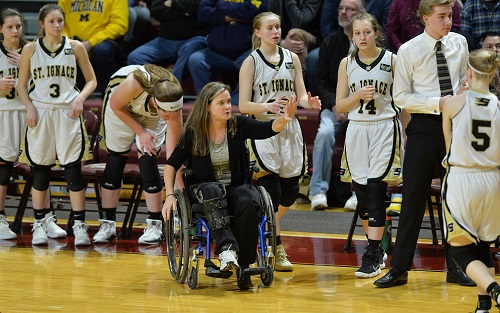 “This benefit game and ensuing experiences for the team have taught us about being grateful for every day we do have and to have the courage to fight through adversity,” Ingalls said. “These vital lessons will carry on in all of us for a lifetime.
“This benefit game and ensuing experiences for the team have taught us about being grateful for every day we do have and to have the courage to fight through adversity,” Ingalls said. “These vital lessons will carry on in all of us for a lifetime.
“In fact I recently received a photo from a former player sitting in one of the infusion chairs getting treatment for an autoimmune disease that really struck me deeply. Talk about full circle.”
Ingalls is a 1986 graduate of New Baltimore Anchor Bay High School, where she played basketball, volleyball and softball. She attended Lake Superior State University, earning a bachelor’s degree in geology in 1991, and she then moved to St. Ignace to begin six years as a geologist before starting a screen printing and embroidery business.
She had earned 10 letters playing four sports at LSSU – volleyball, basketball, softball and tennis – and soon after moving to St. Ignace she joined the Saints’ coaching ranks, first as a junior high and assistant junior varsity basketball coach in 1992-93, then junior varsity girls head coach from 1994-98 until she took over the varsity position. She also has coached softball and subvarsity boys basketball.
Ingalls and husband Doug have two sons, Jackson and Jonathan.
The first Women In Sports Leadership Award was presented in 1990.
Past recipients
1990 – Carol Seavoy, L’Anse
1991 – Diane Laffey, Harper Woods
1992 – Patricia Ashby, Scotts
1993 – Jo Lake, Grosse Pointe
1994 – Brenda Gatlin, Detroit
1995 – Jane Bennett, Ann Arbor
1996 – Cheryl Amos-Helmicki, Huntington Woods
1997 – Delores L. Elswick, Detroit
1998 – Karen S. Leinaar, Delton
1999 – Kathy McGee, Flint
2000 – Pat Richardson, Grass Lake
2001 – Suzanne Martin, East Lansing
2002 – Susan Barthold, Kentwood
2003 – Nancy Clark, Flint
2004 – Kathy Vruggink Westdorp, Grand Rapids
2005 – Barbara Redding, Capac
2006 – Melanie Miller, Lansing
2007 – Jan Sander, Warren Woods
2008 – Jane Bos, Grand Rapids
2009 – Gail Ganakas, Flint; Deb VanKuiken, Holly
2010 – Gina Mazzolini, Lansing
2011 – Ellen Pugh, West Branch; Patti Tibaldi, Traverse City
2012 – Janet Gillette, Comstock Park
2013 – Barbara Beckett, Traverse City
2014 – Teri Reyburn, DeWitt
2015 – Jean LaClair, Bronson
2016 – Betty Wroubel, Pontiac
2017 – Dottie Davis, Ann Arbor
2018 – Meg Seng, Ann Arbor
2019 – Kris Isom, Adrian
2020 – Nikki Norris, East Lansing
PHOTOS: (Top) St. Ignace girls basketball coach Dorene Ingalls embraces one of her players after their team finished Class C runner-up in 2014. (Middle) Ingalls talks things over with her team during a game at the Breslin Center. (Below) Ingalls coaches her team during a Semifinal win at Calvin College's Van Noord Arena in 2019.

